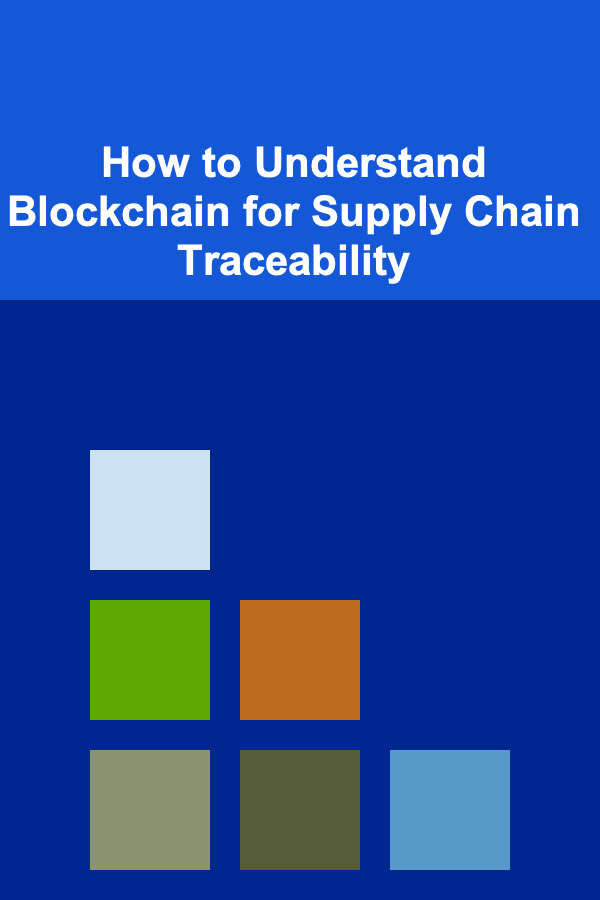
How to Understand Blockchain for Supply Chain Traceability
ebook include PDF & Audio bundle (Micro Guide)
$12.99$10.99
Limited Time Offer! Order within the next:

In recent years, blockchain technology has become synonymous with cryptocurrencies like Bitcoin and Ethereum, but its potential applications stretch far beyond digital currencies. One of the most promising areas where blockchain is making a significant impact is supply chain traceability. By enabling transparent, secure, and decentralized tracking of goods as they move through the supply chain, blockchain is transforming industries ranging from food and pharmaceuticals to electronics and luxury goods.
In this article, we will explore the role of blockchain in supply chain traceability, how it works, and the benefits and challenges of implementing blockchain-based systems. We will also look at real-world use cases and discuss the future of blockchain in supply chain management.
Understanding Blockchain Technology
At its core, blockchain is a distributed ledger technology that records transactions across multiple computers in a way that ensures data integrity and transparency. Unlike traditional centralized databases where a single entity controls the information, blockchain operates in a decentralized manner. Each participant in the network has access to a copy of the ledger, and once a transaction is recorded, it cannot be altered or deleted.
Blockchain is typically associated with cryptocurrencies, but its applications extend far beyond digital currency. It can be used to track anything of value, including goods, services, and even intellectual property, making it an ideal solution for supply chain traceability.
Key Characteristics of Blockchain
- Decentralization: Blockchain eliminates the need for a central authority. Instead, multiple participants (nodes) in the network collectively validate transactions and maintain the ledger.
- Immutability: Once data is recorded on a blockchain, it is nearly impossible to alter or delete. This ensures the integrity of the data and prevents fraud or tampering.
- Transparency: All participants in the network can access the same data, ensuring transparency. This makes blockchain an ideal solution for supply chain traceability, where stakeholders need to verify the origin and movement of goods.
- Security: Blockchain uses advanced cryptographic techniques to secure data, making it highly resistant to hacking and unauthorized access.
- Consensus Mechanisms: Blockchain uses various consensus mechanisms, such as Proof of Work (PoW) or Proof of Stake (PoS), to ensure that all participants agree on the validity of transactions.
Blockchain's Role in Supply Chain Traceability
Supply chains are complex networks that involve multiple parties, including manufacturers, suppliers, distributors, retailers, and consumers. Each stage of the supply chain adds a layer of complexity, and tracking the movement of goods across these stages can be challenging. Traditional methods of supply chain tracking, such as paper-based records and centralized databases, are prone to errors, fraud, and inefficiencies.
Blockchain addresses these challenges by providing a secure, transparent, and immutable system for tracking goods as they move through the supply chain. Here's how blockchain enhances supply chain traceability:
- Tracking the Origin of Goods: Blockchain allows stakeholders to verify the origin of products at any point in the supply chain. For example, a consumer can trace the journey of a product from a farm to a retail store. This is particularly important for industries such as food and pharmaceuticals, where provenance and safety are critical.
- Real-time Updates: Blockchain enables real-time updates on the status of goods as they move through the supply chain. Each participant can update the ledger with relevant information, such as shipment status, location, and condition, ensuring that all stakeholders have access to the most up-to-date data.
- Transparency and Accountability: By recording every transaction on a public ledger, blockchain ensures transparency and accountability throughout the supply chain. Each participant's actions are visible to others, reducing the likelihood of fraud and errors.
- Enhanced Efficiency: Blockchain streamlines supply chain processes by eliminating intermediaries, reducing paperwork, and automating transactions. This leads to faster, more efficient operations and lower costs.
- Smart Contracts: Blockchain can incorporate smart contracts, which are self-executing agreements coded into the blockchain. These contracts automatically execute actions when certain conditions are met, such as releasing payment once a shipment arrives at its destination. Smart contracts can automate various aspects of the supply chain, reducing the need for manual intervention and increasing efficiency.
Benefits of Blockchain for Supply Chain Traceability
The integration of blockchain technology into supply chain traceability offers numerous benefits to businesses, consumers, and other stakeholders. Some of the key advantages include:
- Increased Transparency: Blockchain's decentralized nature allows all parties in the supply chain to have access to the same data. This transparency helps to build trust among stakeholders and provides consumers with greater visibility into the products they purchase.
- Improved Security: The immutability and cryptographic security of blockchain make it resistant to fraud and tampering. This is especially important in industries where the authenticity of goods is critical, such as pharmaceuticals and luxury goods.
- Reduced Fraud and Counterfeiting: Blockchain's transparency and immutability help prevent fraudulent activities, such as the counterfeiting of products. By verifying the authenticity of goods at every stage of the supply chain, businesses can reduce the risk of counterfeit products reaching consumers.
- Cost Savings: By eliminating intermediaries and automating processes with smart contracts, blockchain can significantly reduce costs associated with paperwork, fraud detection, and administrative overhead. This can lead to lower prices for consumers and higher profit margins for businesses.
- Better Compliance and Reporting: Many industries are subject to strict regulatory requirements, such as food safety standards or environmental regulations. Blockchain makes it easier to track compliance by providing a transparent, immutable record of every transaction. This can simplify reporting and auditing processes.
- Enhanced Customer Trust: Consumers are becoming increasingly concerned with the ethical sourcing and sustainability of the products they purchase. Blockchain allows companies to provide verifiable proof of their sourcing practices, helping to build consumer trust.
Challenges in Implementing Blockchain for Supply Chain Traceability
While blockchain offers numerous benefits, implementing it in supply chain traceability is not without its challenges. Some of the key hurdles include:
- Integration with Legacy Systems: Many businesses rely on legacy systems that are not compatible with blockchain technology. Integrating blockchain with existing supply chain infrastructure can be complex and costly.
- Scalability: Blockchain networks can face scalability issues, especially when dealing with a large volume of transactions. As the network grows, transaction speeds may slow down, leading to delays in updating the ledger.
- Data Privacy: While blockchain is transparent, certain industries may require data privacy due to sensitive information, such as trade secrets or customer data. Finding a balance between transparency and privacy is a key challenge for blockchain adoption.
- Regulatory Uncertainty: Blockchain is still a relatively new technology, and regulatory frameworks around its use are still evolving. Companies may face uncertainty regarding how to comply with laws and regulations related to blockchain in supply chains.
- High Initial Costs: While blockchain can lead to cost savings in the long run, the initial investment required to implement blockchain-based systems can be significant. This includes costs for software development, training, and infrastructure upgrades.
- Lack of Standards: There is currently no universal standard for blockchain implementation in supply chain traceability. Different industries may adopt different blockchain protocols, which could hinder interoperability between systems.
Real-World Use Cases of Blockchain in Supply Chain Traceability
Several companies are already leveraging blockchain technology to improve supply chain traceability. Below are some notable examples:
- Walmart and IBM (Food Safety): Walmart has partnered with IBM to implement a blockchain-based system for tracing the origin of food products. The system allows the company to trace the journey of products such as mangoes from the farm to the store, ensuring food safety and reducing the time it takes to identify and address foodborne illness outbreaks.
- Maersk and IBM (Shipping): Maersk, a global shipping giant, has teamed up with IBM to create TradeLens, a blockchain-based platform for tracking shipping containers. TradeLens allows all stakeholders in the shipping process to access real-time data on the location and condition of goods, improving efficiency and reducing the risk of fraud.
- De Beers (Diamonds): De Beers, one of the world's largest diamond producers, is using blockchain to trace the journey of diamonds from mine to market. The blockchain ensures that the diamonds are conflict-free and not sourced from regions with human rights violations.
- Everledger (Luxury Goods): Everledger is a blockchain-based platform that helps track the provenance of luxury goods, such as jewelry and artwork. By providing a transparent and immutable record of ownership, Everledger helps reduce the risk of fraud and counterfeiting in the luxury goods market.
The Future of Blockchain in Supply Chain Traceability
The future of blockchain in supply chain traceability looks promising. As more businesses recognize the benefits of blockchain, its adoption is expected to grow across a wide range of industries. Innovations in blockchain scalability, privacy, and interoperability will likely address many of the challenges currently hindering its widespread use.
In the coming years, we can expect to see more companies integrating blockchain into their supply chain operations, resulting in increased transparency, efficiency, and security. Blockchain could also play a pivotal role in promoting sustainability by enabling businesses to track the environmental impact of their supply chains and verify their sustainability claims.
Conclusion
Blockchain technology is revolutionizing supply chain traceability by providing a secure, transparent, and immutable way to track goods as they move through the supply chain. With its ability to enhance transparency, improve security, and reduce costs, blockchain is poised to become a game-changer in industries ranging from food and pharmaceuticals to luxury goods and electronics.
However, the adoption of blockchain in supply chain traceability is not without its challenges, including integration with legacy systems, scalability issues, and regulatory uncertainty. Despite these hurdles, the real-world success stories of companies like Walmart, Maersk, and De Beers demonstrate the potential of blockchain to transform supply chains and improve the way goods are tracked, verified, and authenticated.
As the technology continues to evolve, blockchain is likely to become an essential tool for businesses seeking to improve supply chain transparency, reduce fraud, and build consumer trust. The future of blockchain in supply chain traceability is bright, and its impact on the global supply chain ecosystem will only continue to grow.

How to Create Ambiance with Lighting on a Budget
Read More
How to Sell Programming Services on Freelancing Platforms: An Actionable Guide
Read More
Why You Should Use Zone-Based Organization in the Kitchen
Read More
How to Practice Yoga for a Balanced Life
Read More
How to Build a Strong Content Recycling Strategy
Read More
10 Tips for Automating Your Performance Management Planner
Read MoreOther Products

How to Create Ambiance with Lighting on a Budget
Read More
How to Sell Programming Services on Freelancing Platforms: An Actionable Guide
Read More
Why You Should Use Zone-Based Organization in the Kitchen
Read More
How to Practice Yoga for a Balanced Life
Read More
How to Build a Strong Content Recycling Strategy
Read More